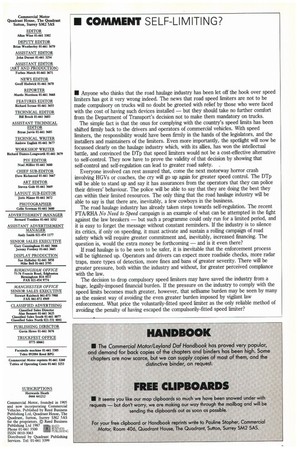• COMMENT SELF-LIMITING?
Page 5

If you've noticed an error in this article please click here to report it so we can fix it.
• Anyone who thinks that the road haulage industry has been let off the hook over speed limiters has got it very wrong indeed. The news that road speed limiters are not to be made compulsory on trucks will no doubt be greeted with relief by those who were faced with the cost of having such devices installed — but they should take no further comfort from the Department of Transport's decision not to make them mandatory on trucks.
The simple fact is that the onus for complying with the country's speed limits has been shifted firmly back to the drivers and operators of commercial vehicles. With speed limiters, the responsibility would have been firmly in the hands of the legislators, and the installers and maintainers of the limiters. Even more importantly, the spotlight will now be focussed clearly on the haulage industry which, with its allies, has won the intellectual battle, and convinced the DTp that speed limiters would not be a cost-effective alternative to self-control. They now have to prove the validity of that decision by showing that self-control and self-regulation can lead to greater road safety. .
Everyone involved can rest assured that, come the next motorway horror crash involving HGVs or coaches, the cry will go up again for greater speed control. The DTp will be able to stand up and say it has assurances from the operators that they can police their drivers' behaviour. The police will be able to say that they are doing the best they can within their limited resources. The only thing that the road haulage industry will be able to say is that there are, inevitably, a few cowboys in the business.
The road haulage industry has already taken steps towards self-regulation. The recent FTA/RHA No Need to Speed campaign is an example of what can be attempted in the fight against the law breakers — but such a programme could only run for a limited period, and it is easy to forget the message without constant reminders. If the industry is to silence its critics, if only on speeding, it must activate and sustain a rolling campaign of road safety which will require greater commitment and, inevitably, increased financing. The question is, would the extra money be forthcoming — and is it even there?
If road haulage is to be seen to be safer, it is inevitable that the enforcement process will be tightened up. Operators and drivers can expect more roadside checks, more radar traps, more types of detection, more fines and bans of greater severity. There will be greater pressure, both within the industry and without, for greater perceived compliance with the law.
The decision to drop compulsory speed limiters may have saved the industry from a huge, legally-imposed financial burden. If the pressure on the industry to comply with the speed limits becomes much greater, however, that selfsame burden may be seen by many as the easiest way of avoiding the even greater burden imposed by vigilant law enforcement. What price the voluntarily-fitted speed limiter as the only reliable method of avoiding the penalty of having escaped the compulsorily-fitted speed limiter?
































































































